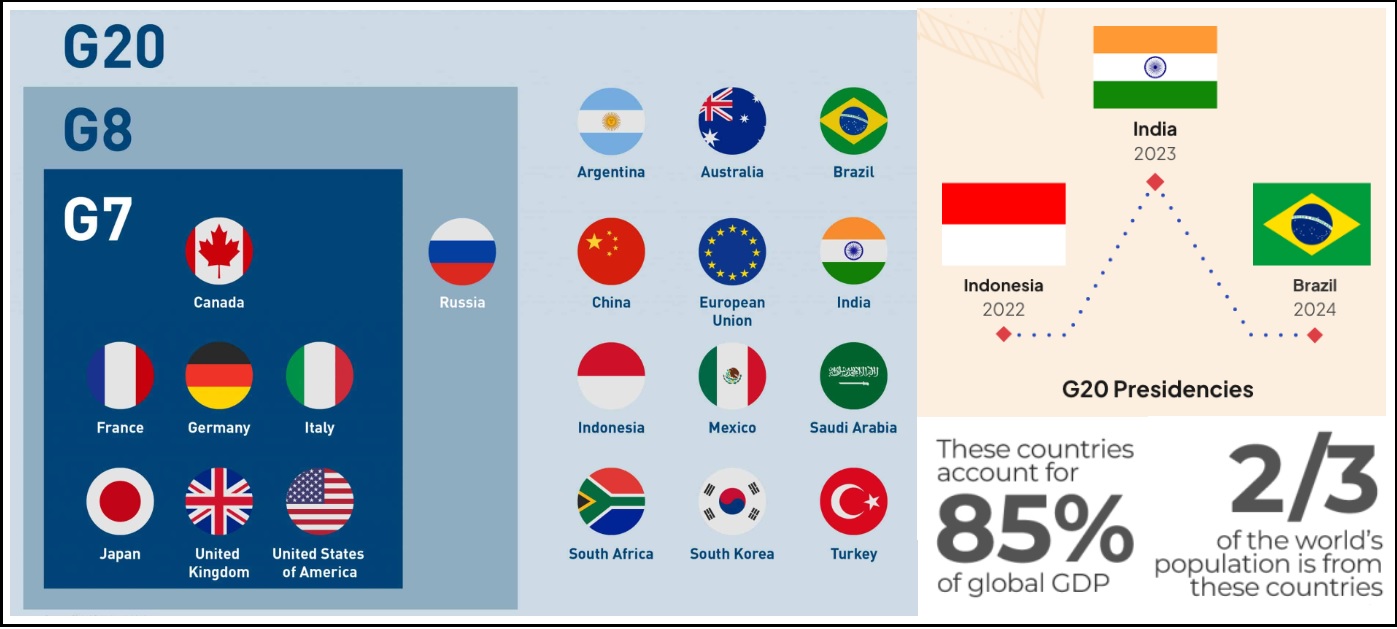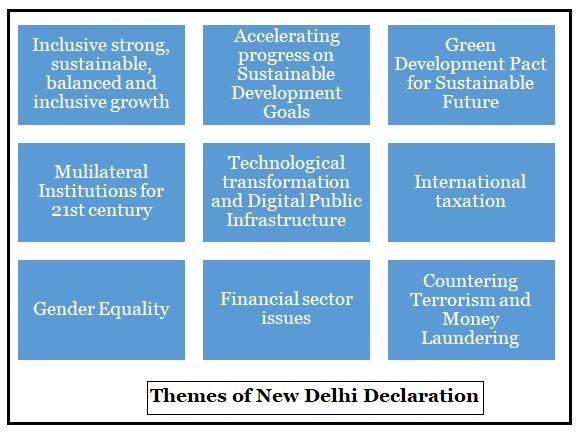|
Outcomes
|
Description
|
Significance
|
|
Russia-Ukraine War
|
- G20 nations agreed that states cannot grab territory by force and highlighted the suffering of the people of Ukraine, but avoided direct criticism of Russia for the war.
|
- India along with Brazil, Indonesia and South Africa, played a key role in avoiding a fracturing of the G20 over the Ukraine conflict, reflecting the growing power of the Global South developing nations in the group.
|
|
Inclusion of African Union
|
- The 55-member African Union was formally made permanent member of the G20, on par with the European Union, in order to make the grouping more representative.
- Until now only South Africa was a member of the G20.
|
- The entry of the AU would provide greater voice to the Global South within the G20 where the G7 countries have long played a dominant role.
To know more about India’s G20 Presidency and focus on Africa click here
|
|
India-Middle East-Europe Economic Corridor (IMEE-EC)
|
- A multinational rail and shipping project linking India with the Middle East and Europe has been announced.
- The corridor would include India, Saudi Arabia, the United Arab Emirates, Jordan, Israel and the European Union.
|
- It will challenge China’s economic ambitions in the region.
- It aims to boost trade, deliver energy resources and improve digital connectivity.
|
|
Climate change
|
- The G20 leaders agreed to pursue tripling renewable energy capacity globally by 2030 and accepted the need to phase-down unabated coal power.
- It stressed the urgency of mobilizing “US$5.8-5.9 trillion in the pre-2030 period for developing countries” and “US$4 trillion per year for clean energy technologies by 2030.
|
- It will help countries to attain net-zero emissions by 2050.
|
|
Green Development Pact
|
The declaration
- Envisages a green development pact
- Endorses high-level principles on lifestyle
- Voluntary principles of hydrogen
- Chennai principles for a sustainable resilient blue economy
- Deccan principles on food security and nutrition among others
|
Objectives of this move involves
- Sustainable development
- Resilient blue economy
- Food security and nutrition
- Climate financing
|
|
Global bio fuel alliance
|
- It is an alliance driven by India, the United States, and Brazil, is a concerted effort to address pressing energy and economic challenges through sustainable biofuels.
|
- The inauguration of the Global Biofuel Alliance at the G20 Summit signifies a pivotal moment in the pursuit of sustainable energy solutions.
|
|
Digital Public Infrastructure (DPI)
|
- A G20 Framework for Systems of Digital Public Infrastructure, a voluntary framework for the development, deployment and governance of DPI has been unanimously accepted.
- The declaration also mentions the approval of India’s plan to build and maintain Global Digital Public Infrastructure Repository.
- The declaration takes note of the proposal to create One Future Alliance, a voluntary initiative.
|
- The repository will be a virtual stack where non-G20 and G-20 countries can voluntarily share their open-source mechanisms.
- One Future Alliance will assist and fund the implementation of digital public infrastructure in low and middle income countries.
|
|
Reform of Multilateral Development Banks
|
- The member countries endorsed the G20 Roadmap for Implementing the Recommendations of the G20 Independent Review of MDBs Capital Adequacy Frameworks and called for its implementation.
|
- The Capital Adequacy Frameworks (CAF) recommendations are focused on enabling MDBs to use the existing resources effectively.
|
|
G20 Satellite Mission
|
- India has proposed to launch the G20 satellite mission for environment and climate observation
|
- It aims to help the countries of Global South for environment and climate observation.
|

